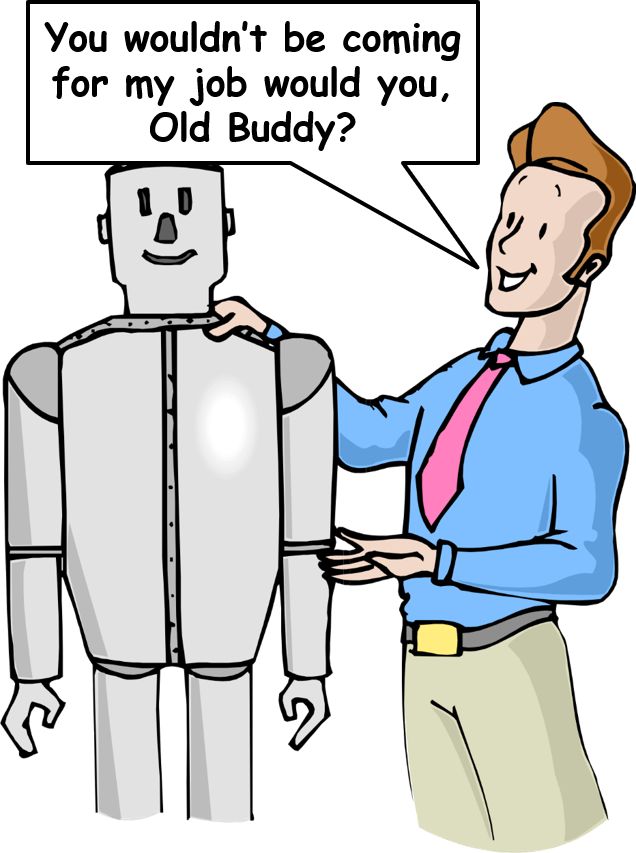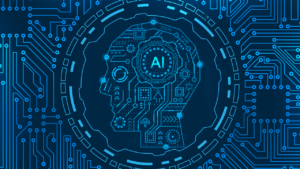Arguing that some jobs now being performed by humans aren’t going to be lost to technology (be it hardware (e.g., robots) or software (i.e., artificial intelligence)) would be foolish. One of the motivations behind the advance of technology has always been to get machines to perform work that is repetitive or a drudgery for humans. That motivation will continue to drive technological progress and people holding down those kinds of jobs are at risk of losing them. Conner Forrest (@ConnerForrest) predicts that the next ten jobs that are going to be automated by artificial intelligence (AI) and robots are: assembly line workers; field technicians; call center workers; sorters; data entry personnel; insurance underwriters; tax preparers; sales representatives; translators; and fast food employees.[1] Martin Ford (@MFordFuture), founder of a Silicon Valley-based software development firm and author of Rise of the Robots: Technology and the Threat of a Jobless Future, goes even further and paints a very dark employment picture for the future. The introduction to his book states:
“The more Pollyannaish, or just simply uninformed, might imagine that this industrial revolution will unfold like the last: even as some jobs are eliminated, more will be created to deal with the new devices of a new era. In Rise of the Robots, Martin Ford argues that is absolutely not the case. Increasingly, machines will be able to take care of themselves, and fewer jobs will be necessary. The effects of this transition could be shattering. Unless we begin to radically reassess the fundamentals of how our economy works, we could have both an enormous population of the unemployed-the truck drivers, warehouse workers, cooks, lawyers, doctors, teachers, programmers, and many, many more, whose labors have been rendered superfluous by automated and intelligent machines — and a general economy that, bereft of consumers, implodes under the weight of its own contradictions. We are at an inflection point — do we continue to listen to those who argue that nothing fundamental has changed, and take a bad bet on a miserable future, or do we begin to discuss what we must do to ensure all of us, and not just the few, benefit from the awesome power of artificial intelligence? The time to choose is now.”
Not everyone who believes that jobs can be created and employment levels sustained in the years ahead can be called either a Pollyanna or uninformed. Such name-calling is dismissive and unworthy of genuine debate. Alex Hern (@alexhern) sums up the current state of the debate about artificial intelligence (AI) and robotics and their potential to disrupt the workforce when he writes, “Experts are divided over the role of robots over the next decade, with some arguing that they will create more jobs than they displace, and others worrying that they could lead to income inequality and a breakdown in social order.”[2] To learn more about the arguments being raised on both sides of the debate, read my article entitled “Artificial Intelligence: Job Creator or Job Destroyer?” Admittedly, those are stark choices and they beg the question: Is there way to ensure that we head down the better path in the years ahead? Like Ford, I agree that we stand at an inflection point. Robert Frost’s famous poem “The Road Not Taken” provides a good metaphor for the choices that lie ahead. He wrote:
Two roads diverged in a yellow wood,
And sorry I could not travel both
And be one traveler, long I stood
And looked down one as far as I could
To where it bent in the undergrowth;Then took the other, as just as fair,
And having perhaps the better claim,
Because it was grassy and wanted wear;
Though as for that the passing there
Had worn them really about the same,And both that morning equally lay
In leaves no step had trodden black.
Oh, I kept the first for another day!
Yet knowing how way leads on to way,
I doubted if I should ever come back.I shall be telling this with a sigh
Somewhere ages and ages hence:
Two roads diverged in a wood, and I—
I took the one less traveled by,
And that has made all the difference.
Metaphorically we are now standing at the edge of the yellow wood with choices lying before us and the road we take will indeed make all the difference. As I noted in previous articles, we can’t delay thinking about the implications of a society characterized by chronic unemployment issues and how those issues can be fruitfully addressed. The economy can only grow if consumers have money to spend and that means they must have jobs. If a large number of potential consumers are unemployed, they will have little or no discretionary funds to help grow the economy. If that’s the future that emerges, then companies that displace workers in the pursuit of efficiency and profits will be digging their own graves. I believe there is a future in which machines and humans can work in harmony (i.e., human/machine collaboration) and that jobs can be created in new industries to help maintain full employment. It will take hard work and imagination; but it can and must be done. I certainly don’t have all of the answers; but, I would like to explore the subject.
First of all, I agree with Anup Varier, who believes that the future belongs to teams of humans and computers working together.[3] He writes, “Gartner’s studies explain that ‘humans versus machines’ is not a binary decision; sometimes machines working alongside humans is a better choice. … At a time when humans are clearly reaching the limits of what we can absorb and understand, Gartner suggests the main benefit of having machines working alongside humans is the ability to access the best of both worlds (that is, productivity and speed from machines, emotional intelligence, and the ability to handle the unknown from humans).” I personally believe that the future will be characterized by this kind of human/machine collaboration. Nevertheless, this cooperation won’t naturally emerge. We have to figure out where smart machines can best be employed and how they can assist humans in doing a better job.
We don’t know exactly which jobs will be lost to machines; but, based on historical trends I agree with Forrest that it’s probably safe to say jobs involving repetitive actions are going to be automated. Areas where man/machine collaboration will be most prominent will involve jobs that require extensive decision making. Bain analysts, Michael C. Mankins and Lori Sherer (@lorisherer), note that decision making is one of the most important aspects of any business. “The best way to understand any company’s operations,” they write, “is to view them as a series of decisions.”[4] They explain:
“People in organizations make thousands of decisions every day. The decisions range from big, one-off strategic choices (such as where to locate the next multibillion-dollar plant) to everyday frontline decisions that add up to a lot of value over time (such as whether to suggest another purchase to a customer). In between those extremes are all the decisions that marketers, finance people, operations specialists and so on must make as they carry out their jobs week in and week out. We know from extensive research that decisions matter — a lot. Companies that make better decisions, make them faster and execute them more effectively than rivals nearly always turn in better financial performance. Not surprisingly, companies that employ advanced analytics to improve decision making and execution have the results to show for it.”
Allowing AI to make routine decisions frees human decision makers to concentrate on more important decisions. As a result, Varier concludes that cognitive systems will help humans operate in a rapidly changing environment without disruptions. In the concluding part of this article, I’ll begin to explore ways that employment can be sustained in the years ahead; because, I believe, as does Ford, we need “to ensure all of us, and not just the few, benefit from the awesome power of artificial intelligence.” There remain a lot of questions and few answers. I agree with Ford that finding those answers before it is too late should be an imperative for every business person, labor leader, government official, academic, and think tank expert.
Footnotes
[1] Conner Forrest, “The first 10 jobs that will be automated by AI and robots,” ZDNet, 3 August 2015.
[2] Alex Hern, “Will robots take our jobs? Experts can’t decide,” The Guardian, 6 August 2014.
[3] Anup Varier, “Next up: Humans, systems team in cognitive computing,” PCWorld, 23 December 2013
[4] Michael C. Mankins and Lori Sherer, “Creating value through advanced analytics,” Bain Brief, 11 February 2015.





